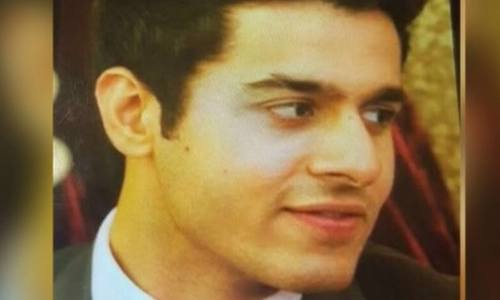KARACHI: The Sindh government has decided to set up joint interrogation teams (JITs) on the kidnapping of young lawyer and son of the Sindh High Court chief justice Awais Shah and the killing of renowned qawwal Amjad Sabri, said the home minister on Friday.
Sohail Anwar Siyal added that the JITs composed of representatives of intelligence agencies, Rangers and police would help take forward the investigations into the two high-profile cases.
He announced a reward of Rs5 million for any information leading to the arrest of killers of Amjad Sabri.
Speaking at a press conference at the Karachi Police Office (KPO) after chairing a meeting in which the progress in both cases was reviewed, the home minister said the domain of investigation into the kidnapping of Awais Shah had been enhanced and now the investigators would also work in other provinces.
The minister regretted that the kidnapping incident took place at around 2.30pm, but the police were not aware of it until 9pm.
He said the gap of six hours was huge, however, investigators had got ‘some clues’ and they were working on them.
Mr Siyal deplored that the federal government appeared reluctant to give a no-objection certificate to the Sindh government for access to the Global System for Mobile Communications (GSM) locators.
“Lack of access to GSM locators, geo-fencing and Nadra family tree was creating hindrance for the Sindh police in investigation purposes,” the minister said.
However, he expressed the hope that with taking up this issue at the apex committee, they hoped to get access to GSM locators.
Inspector General of Sindh police A. D. Khowaja, on this occasion, admitted that investigations into both the high-profile cases were still at an ‘extremely initial level’ as the kidnappers had not made any call, nor responsibility was claimed by anyone.
The police had conducted a search operation in Dadu and Jamshoro but they could not get any ‘positive lead’, he said.
Replying to a question, Additional Inspector General of police of Karachi Mushtaq Ahmed Mahar said they had enhanced security to the extent that a few major shopping centres were virtually closed on June 17 over receiving terror threat, but the police had not received any report about the high-profile kidnapping or killing.
The IG police also corroborated his views by saying that the police had not received any intelligence report about high-profile personality’s purported target in Liaquatabad.
Replying to a question about taking action against ‘facilitators’ mentioned in the JITs, the adviser to the chief minister on law, Murtaza Wahab, said no concrete evidence had emerged against the purported facilitators in these reports.
The home minister on this occasion added that ‘last paragraph’ of all JITs reports usually mentioned that ‘further probe’ was needed because JITs were mainly based on statements of suspects.
Replying to a question, IG Khowaja admitted that closed-circuit television cameras were not much help for police in investigation as their quality appeared to be below standards.
He pointed out that there over 2,000 secret cameras installed in the city. Out of which 967 belonged to the Sindh police, 1,400 to Karachi Metropolitan Corporation and 100 to traffic police for traffic management.
The provincial police chief revealed that KMC’s 90pc cameras were functional while only 20pc cameras of police were functioning.
Most of the secret cameras of the police had stopped functioning because of lack of provision of funds for maintenance. However, he disclosed that in new financial year, the provincial government had earmarked budget for this purpose and the police were expected to make these cameras ‘functional’, but further improvement would require ‘specific budget provision’ to bring these cameras to meet international standards.
The IG police pointed out that there were 60,000 cameras installed in London, which was a small city as compared to Karachi, indicating that the metropolis needed much more cameras.
He said they were also revamping the Special Branch as this branch had a ‘technical edge’ over other units of the police.
“These cameras had been found less helpful in detecting crimes but it did not mean that these cameras were useless,” opined the IG police.
Replying to another question, the IG police suggested that terrorism would not end in days, but instead it was a ‘constant’ fight against terrorists.
Referring to Friday’s terror act in Quetta and past acts in Peshawar and Lahore, IG Khowaja said after launching Zarb-i-Azb “we are fighting ideological war and this is the war of the whole nation”.
Earlier, at the start of the press conference, the home minister urged the media especially electronic to avoid leaking information or CCTV footages, which may ‘benefit’ criminals.
Mr Siyal also advocated a sort of regulation or some check on social media as unverified news was being shared/commented there.
Published in Dawn, June 25th, 2016













































